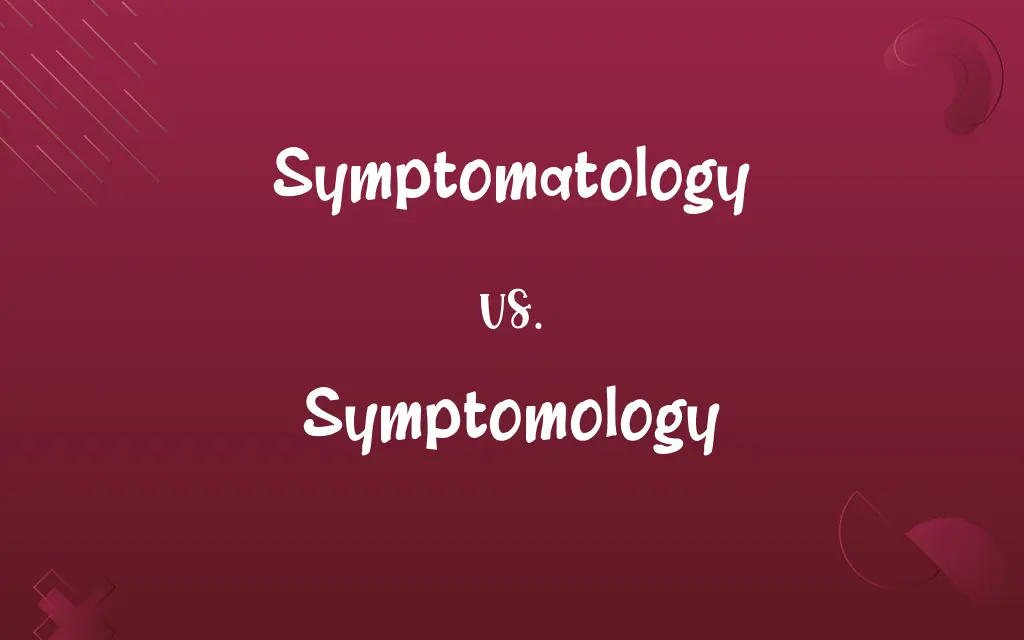Symptomatology vs. Symptomology: Know the Difference

By Dua Fatima & Hifza Nasir || Updated on March 3, 2024
Symptomatology involves the systematic study of symptoms for diagnosing diseases, focusing on patterns and causes, while symptomology refers more generally to the collection and description of symptoms.

Key Differences
Symptomatology is a comprehensive term that encompasses the study and analysis of symptoms in the context of diseases and medical conditions. It aims to understand the underlying causes and mechanisms of symptoms, which aids in diagnosis and treatment planning. Whereas, symptomology is often used interchangeably but tends to have a narrower scope, primarily focusing on the identification and listing of symptoms associated with specific conditions without delving deeply into their causes or interrelations.
Hifza Nasir
Mar 03, 2024
Symptomatology is an integral part of medical research and practice, requiring a thorough understanding of pathophysiology to link symptoms with particular diseases. It is methodical and detailed, relying on clinical evidence to establish connections between symptoms and medical conditions. On the other hand, symptomology might be employed more casually in discussions about health and disease, emphasizing the observation and description of symptoms rather than a deep analysis of their significance or origin.
Dua Fatima
Mar 03, 2024
In academic and clinical settings, symptomatology is a critical field that supports clinicians and researchers in developing diagnostic criteria and treatment approaches. It often involves interdisciplinary studies, incorporating insights from various medical specialties to create a holistic view of patient symptoms. Conversely, symptomology, while useful, is typically seen as less rigorous and may not always incorporate the latest research or clinical practices in its approach to symptom description.
Dua Fatima
Mar 03, 2024
Symptomatology often requires specialized training and knowledge, enabling healthcare professionals to interpret symptoms in the context of the latest medical science. This expertise is crucial for accurate diagnosis and effective treatment planning. Symptomology, while also important, does not necessarily demand the same level of specialized knowledge, and can be utilized by a wider range of individuals, including patients and non-specialist healthcare workers, to communicate about symptoms.
Shumaila Saeed
Mar 03, 2024
The terminology used in symptomatology is precise, aiming to categorize and understand symptoms in a way that is useful for medical diagnosis and treatment. This includes differentiating between similar symptoms that may have different causes or implications. Symptomology, in contrast, may use a more general language to describe symptoms, focusing on the experience of the patient rather than the precise medical implications of each symptom.
Dua Fatima
Mar 03, 2024
ADVERTISEMENT
Comparison Chart
Definition
The study of symptoms, including their patterns and causes, to aid in diagnosing diseases.
The description and collection of symptoms related to diseases without in-depth analysis.
Hifza Nasir
Mar 03, 2024
Scope
Broad, encompassing analysis and interpretation of symptoms.
Narrower, focusing on identification and listing of symptoms.
Dua Fatima
Mar 03, 2024
Purpose
To understand the underlying causes of symptoms and their relationships to diseases.
To catalog symptoms associated with specific conditions.
Dua Fatima
Mar 03, 2024
Required Expertise
High, requires specialized medical knowledge.
Lower, can be used by a wider audience without specialized training.
Shumaila Saeed
Mar 03, 2024
Clinical Application
Used in diagnosis, treatment planning, and medical research. Involves creating diagnostic criteria.
Primarily used for initial symptom recognition and communication about health conditions.
Dua Fatima
Mar 03, 2024
ADVERTISEMENT
Symptomatology and Symptomology Definitions
Symptomatology
The scientific study of symptoms and their significance in disease diagnosis.
Symptomatology helps doctors differentiate between viral and bacterial infections based on symptom patterns.
Hifza Nasir
Mar 03, 2024
Symptomology
Focuses on the observable aspects of diseases.
Symptomology of skin conditions includes visible signs like rashes and lesions.
Dua Fatima
Mar 03, 2024
Symptomatology
Aids in the formulation of treatment plans by linking symptoms with underlying conditions.
Advanced symptomatology can predict the progression of chronic diseases like diabetes.
Dua Fatima
Mar 03, 2024
Symptomology
The collection and description of symptoms without detailed analysis.
Symptomology lists for common colds include coughing and sneezing.
Hifza Nasir
Mar 03, 2024
Symptomatology
Focuses on the comprehensive analysis of patient symptoms.
Symptomatology studies have led to the identification of new symptoms for COVID-19.
Hifza Nasir
Mar 03, 2024
ADVERTISEMENT
Symptomology
Can be applied by non-specialists to communicate health concerns.
Nurses often use symptomology to triage patients in emergency rooms.
Dua Fatima
Mar 03, 2024
Symptomatology
Requires an understanding of the pathophysiology of diseases.
Symptomatology training is essential for identifying emergent diseases in epidemiology.
Shumaila Saeed
Mar 03, 2024
Symptomology
Helps in the initial recognition of diseases.
Basic symptomology is sufficient for identifying influenza in community settings.
Hifza Nasir
Mar 03, 2024
Symptomatology
Involves categorizing symptoms to understand their origins and implications.
Symptomatology in psychiatry is crucial for distinguishing between different mental health disorders.
Dua Fatima
Mar 03, 2024
Symptomology
Used in general health discussions and patient education.
Symptomology charts help patients understand when to seek medical advice.
Dua Fatima
Mar 03, 2024
Symptomatology
The doctrine of symptoms; that part of the science of medicine which treats of the symptoms of diseases; semeiology.
Dua Fatima
Oct 19, 2023
Repeatedly Asked Queries
What does symptomology mean?
Symptomology refers to the collection and description of symptoms related to specific conditions, without a detailed analysis of their causes.
Dua Fatima
Mar 03, 2024
Can non-medical professionals engage in symptomology?
Yes, symptomology can be used by patients and non-specialists to communicate health concerns and recognize when medical advice is needed.
Dua Fatima
Mar 03, 2024
Why is symptomatology important in diagnosis?
It allows healthcare professionals to understand the underlying causes of symptoms and their relationships to diseases, facilitating accurate diagnosis and effective treatment planning.
Hifza Nasir
Mar 03, 2024
Can symptomology be used in emergency settings?
Yes, symptomology can help triage patients by providing a quick reference to identify and prioritize urgent health concerns.
Hifza Nasir
Mar 03, 2024
What is symptomatology?
Symptomatology is the study of symptoms, their patterns, and causes, aimed at aiding in the diagnosis and treatment of diseases.
Hifza Nasir
Mar 03, 2024
Are there any tools or methods specific to symptomatology?
Yes, symptomatology uses various diagnostic criteria, scales, and questionnaires to analyze and interpret symptoms systematically.
Dua Fatima
Mar 03, 2024
Does symptomatology require continuous education?
Yes, as medical knowledge evolves, professionals must stay updated on new research and diagnostic techniques in symptomatology.
Hifza Nasir
Mar 03, 2024
How is symptomology useful in public health?
It aids in the early detection and response to outbreaks by helping identify disease symptoms in the population.
Shumaila Saeed
Mar 03, 2024
Is symptomatology only used in physical health?
No, it is also crucial in psychiatry and psychology for diagnosing mental health disorders based on symptom patterns.
Dua Fatima
Mar 03, 2024
How does symptomatology differ from symptomology in medical practice?
Symptomatology involves a comprehensive analysis and interpretation of symptoms for clinical purposes, while symptomology is more about identifying and listing symptoms.
Dua Fatima
Mar 03, 2024
How does symptomatology help in treatment planning?
By understanding the cause and significance of symptoms, clinicians can develop more effective, targeted treatment plans.
Dua Fatima
Mar 03, 2024
How do patients benefit from understanding symptomology?
Patients can better recognize symptoms of common conditions, making informed decisions about when to seek medical care.
Shumaila Saeed
Mar 03, 2024
How do advancements in medical research impact symptomatology?
They refine the understanding of diseases and symptoms, leading to improved diagnostic criteria and treatment approaches based on symptomatology.
Shumaila Saeed
Mar 03, 2024
Can symptomatology predict disease progression?
Yes, by analyzing symptom patterns, symptomatology can offer insights into the likely course and prognosis of diseases.
Hifza Nasir
Mar 03, 2024
What role does symptomology play in patient education?
It provides patients with understandable information about symptoms of various conditions, empowering them to participate actively in their healthcare.
Dua Fatima
Mar 03, 2024
Share this page
Link for your blog / website
HTML
Link to share via messenger
About Author
Written by
Dua FatimaCo-written by
Hifza Nasir







































































